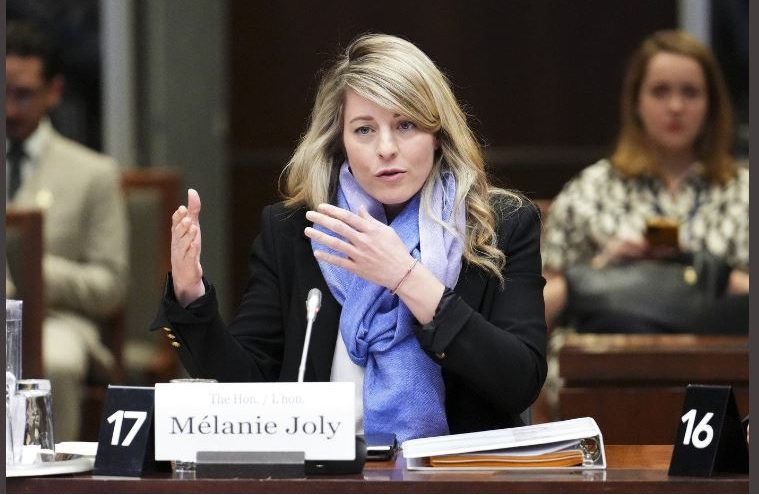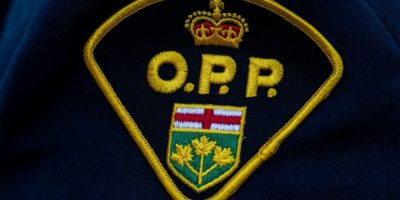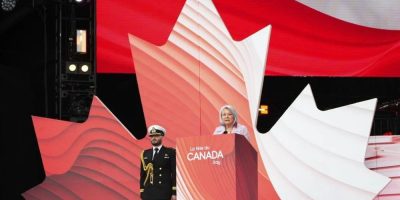
By Dylan Robertson in Ottawa
The Liberal government is summoning China's ambassador over allegations by Canada's spy agency that a Chinese diplomat in Toronto was involved in a plot to intimidate a Conservative MP and his family.
Foreign Affairs Minister Mélanie Joly said Thursday she asked her deputy minister to tell Chinese Ambassador Cong Peiwu that Canada will not tolerate any form of foreign interference in its affairs.
Joly confirmed media reports that the Canadian Security Intelligence Service believes a diplomat working out of China's Toronto consulate had targeted Conservative MP Michael Chong and his relatives in Hong Kong, due to his criticism of Beijing's human-rights record.
"What has happened is completely unacceptable," Joly told the House of Commons foreign affairs committee Thursday morning, looking across the room to Chong.
"All options including expulsion of diplomats remains on the table, as we consider the consequences for this behaviour," Joly said.
The Opposition Conservatives are urging the Liberals to expel the diplomat. Joly said she will make sure all foreign envoys follow the United Nations agreement that sets out acceptable activities.
"All foreign agents in Canada must abide by the Vienna Convention. If they do not, there will be consequences," she told MPs.
Joly expressed her sympathy for Chong, who glared at Joly asking why the diplomat had not already been sent packing.
"I cannot imagine the shock and concern of learning that your loved ones have been targeted in this way," Joly said.
Chong appeared unimpressed.
"So why is this diplomat still here?" he asked.
"A diplomat who has more rights and immunities than the Canadians around this table, to go around and conduct his foreign-interference threat activities. He has diplomatic immunity; he cannot be criminally prosecuted."
The Conservatives insist the federal Liberal government failed to act on the threat that came up two years ago, but Prime Minister Justin Trudeau said this week that the security agency made the decision not to notify anyone.
Conservative Leader Pierre Poilievre has presented a motion in the House of Commons asking MPs to call on the government to take more aggressive action against threats of foreign interference, including expelling Chinese diplomats.
Trudeau said Wednesday that he had only learned after a Globe and Mail article on Monday, citing top-secret documents, said CSIS had the intelligence. He said he has ordered Canada's intelligence agencies to immediately inform MPs of any threats against them, regardless of whether those threats are considered credible.
"CSIS made the determination that it wasn't something that needed to be raised to a higher level because it wasn't a significant enough concern," Trudeau said Wednesday.
He said that around the same time, CSIS was asked to brief Chong after China publicly said it would sanction him for criticizing Beijing's treatment of Uyghur Muslims in China's Xinjiang province.
But the agency never told Chong about any threats.
Earlier Thursday in Beijing, China’s Foreign Ministry played down allegations of China trying to intimidate Chong and his relatives.
"China is opposed to any interference in a country’s internal affairs. We never interfere in Canada’s internal affairs and have no interest whatsoever in doing so," spokeswoman Mao Ning told reporters, according to an official English transcription.
"We are resolute in defending our sovereignty, security and development interests and opposing actions that interfere in China’s internal affairs and harm China’s interests."
Meanwhile, CSIS shed some more light Thursday on other ways it views China as attempting to meddle in Canadian affairs.
In its 2022 public report, tabled Thursday in Parliament, CSIS noted reports that subnational affiliates of the China's Ministry of Public Security had set up three overseas "police stations" in Canada without permission from Ottawa.
"CSIS has observed instances where representatives from various investigatory bodies in the (People's Republic of China) have come to Canada, often without notifying local law enforcement agencies, and used threats and intimidation in attempting to force 'fugitive' Chinese-Canadians and permanent residents to return to the PRC."
Foreign interference directed at Canada's democratic institutions and processes, at all levels of government, can be an effective way for a foreign state to achieve its immediate, medium, and long-term strategic objectives, the CSIS report says.
"Foreign states — again, directly and via proxies — may seek to influence electoral nomination processes, shape public discourse or influence policy positions of elected officials using covert tactics. The purpose is to advance issues or policies that favour the foreign state, or quell dissent."
The report says these threat actors must be held accountable for their clandestine activities.
"CSIS will continue to investigate, identify and reduce the threats that foreign interference pose to Canada’s national interests and sovereignty, and will work closely with domestic and international partners in this effort to advise government," it says.
"We will also continue to inform national security stakeholders and all Canadians about foreign interference to the fullest extent possible under the CSIS Act, in order to build our national resilience to this pernicious threat."
CSIS reiterates warnings that the Chinese government and Communist party have established policies and strategic plans to encourage Chinese citizens, the diaspora, foreign scientists and entrepreneurs to contribute to the development of China's science and technology sector.
"These policies and plans aim to exploit the collaborative, transparent, and open nature of Canada's research and innovation sector in order to serve the PRC's economic, intelligence, and military interests. To achieve this, the PRC utilizes talent plans such as the Thousand Talents Plan, talent recruitment stations, and state-funded scholarship programs such as the China Scholarship Council."
This report by The Canadian Press was first published May 4, 2023.





